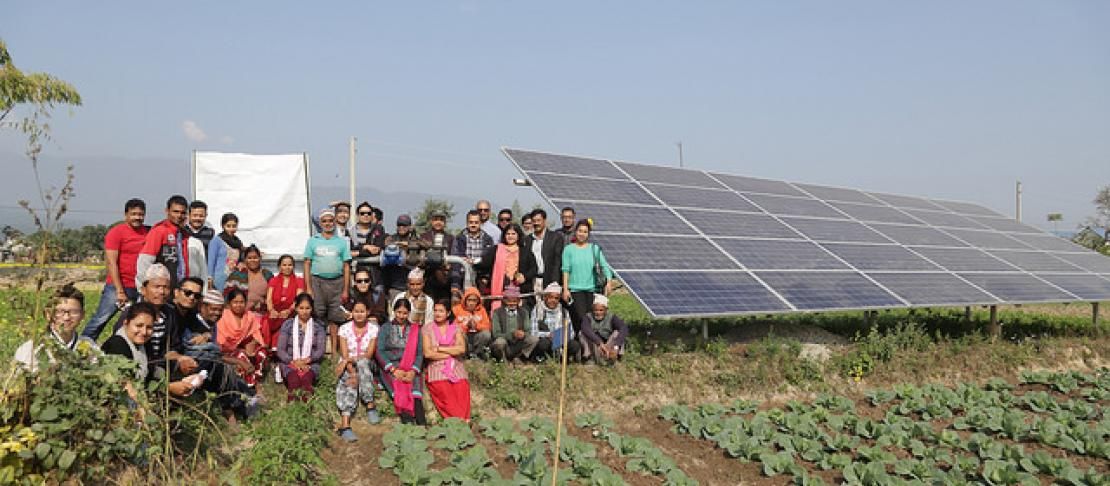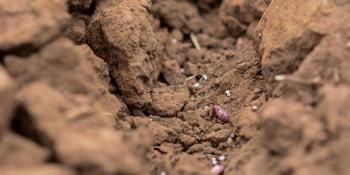Bridging gaps between science and communication

A South Asia regional media workshop enabled mutual dialogue and engagement between scientists and media personnel.
The CGIAR Research Program on Climate Change, Agriculture and Food Security South Asia (CCAFS) recently organized a regional media workshop titled ‘Climate Resilience in South Asian Agriculture and Food Security-Media Perspectives' from 11-13 December in Kathmandu, Nepal. The workshop saw participation from media personnel from India, Nepal and Bangladesh, policymakers, NGO partners and other relevant stakeholders, converging on a forum for direct interaction and mutual dialogue. The workshop included keynote addresses, a panel discussion by the media, individual presenter-media interaction and a field visit to two Climate-Smart Villages (CSVs).
On accomplishments and charting new courses for climate action in South Asia
Day one of the workshop consisted of presentations from the CCAFS team, NGO partners and the government of Nepal to the participating journalists during the first half of the day. Pramod Aggarwal, Regional Program Leader of CCAFS South Asia, inaugurated the presentations with an overarching view of climate change and agriculture in the region, specifically directed towards assessing the options that lie with us in addressing the negative impacts of the phenomena especially on food security.
This was followed by the keynote address delivered by Mr. P. Budathoki, member of the Planning Commission of Nepal, who acquainted the gathering with the latest plans and implementation programs of the government of Nepal with regards to adaptation and mitigation in Nepali agriculture.
A more detailed presentation was made by Arun Khatri-Chhetri, CCAFS South Asia Science Officer, on the Climate-Smart Village approach of promoting climate smart agriculture in various locations across India, Nepal and Bangladesh. The composite idea of a CSV Agricultural Research for Development (AR4D) site was effectively, graphically represented and explained to participating journalists for the latter to have an easier comprehension of what the model entails and how it has been successful in helping farmers adapt and mitigate the effects of climate change on their farms.
Damodar Kanel of World Food Programme spoke to the audience regarding food security monitoring in Nepal with the use of the CCAFS Regional Agricultural Forecasting Toolbox (CRAFT), an open source, flexible crop forecasting platform which has been implemented in Nepal to forecasts yields of wheat and paddy, the results of which has been suggesting strong agreements with of the Ministries so far.
The very crucial element of gender and social inclusion in climate-smart agriculture was put forward by Ms. Lakpa Sherpa, of our local partner, the Local Initiatives for Biodiversity, Research and Development (LI-BIRD) who pointed out the gender blindness that is still prevalent with regards to policies and decision-making. She highlighted the collaborative efforts being undertaken by CCAFS and LI-BIRD in crafting knowledge awareness and capacity enhancement training for the Nepalese policymakers regarding gender and social inclusion in climate-smart agricultural policy plans.
The importance of designing climate savvy insurance schemes was taken up by Pramod Aggarwal. With reference to India’s existing crop insurance scheme he indicated what is working and not working with regards to crop insurance, the way forward and potential for South-South learning.
Finally, a discussion ensued on the National Adaptation Plan of Bangladesh with a detailed presentation by Md. Motaleb Sarker of the Center for Environmental and Geographic Information Services.
The grass on the other side: learning media perspectives
A fascinating exchange of thoughts on science writing, the challenges and successes were discussed through a panel comprising of journalists from the three countries. The discussion was built around the topic of media as a compelling tool for promoting climate justice and food security.
Ankur Pahliwal, an independent science journalist and guest editor of Business Standard, was the moderator of the event who also launched the discussions on telling stories at the intersection of climate science and society. He laid strong emphasis on the need for scientists and communicators to collaborate together to help generate empirical and informative evidence for general audience to undertake climate action.
From the Indian Express, Sowmiya Ashok, through citing her own personal experience, alluded to the challenges that are often confronted by science writers on dispelling myth from reality with regards to climate reporting.
The interesting concept of communication as aid was elaborated upon by Md.Zahid Hassan of BBC Media Action, Bangladesh, who brought forward for the audience his experience in using audio-visuals as a powerful tool to induce behaviour change in people, helping shape their attitudes and action towards climate change.
Finally, Pitamber Sigdel founder of Nature Khabar, Nepal’s first digital platform dedicated solely to environmental causes, spoke of media’s role in shaping policy action in Nepal for climate change. He put forward the real-politik of media reporting and charted out ways through which media can enhance the quality of reporting and coverage of issues relating to climate impacts and food security.
Learning from the source trip to Climate Smart Villages
Day two of the program involved a trip to Nawalparasi which has eight CSVs. A field trip was organized in two of these CSVs, namely, Rajahar and Agyauli. Journalists were given a thorough on-site presentation of the different climate-smart agriculture interventions in these CSVs such as zero-tillage, nutrient management in wheat, solar based irrigation etc. They could also interact individually with members of the solar irrigators cooperative at Rajahar. A further trip to Agyauli provided the participants with the opportunity to visit a community seed bank and enjoy a presentation by members of the local farming community who form part of the management committee of the seed bank. The field exposure allowed the on-site contextualization of the scientific presentations of the previous day that further enriched the overall experience of the program.
The workshop is being lauded for the efforts to engage the scientific community and media/communication professionals in a direct conversation with each other. It has been unanimously recognized that such initiatives should find replication in the near future to continue the flow of information and establish a symbiotic relationship between two communities who are central to the global climate movement.
For more images on the workshop, please see Flickr
Shehnab Sahin is the Communications Specialist at CCAFS South Asia.



